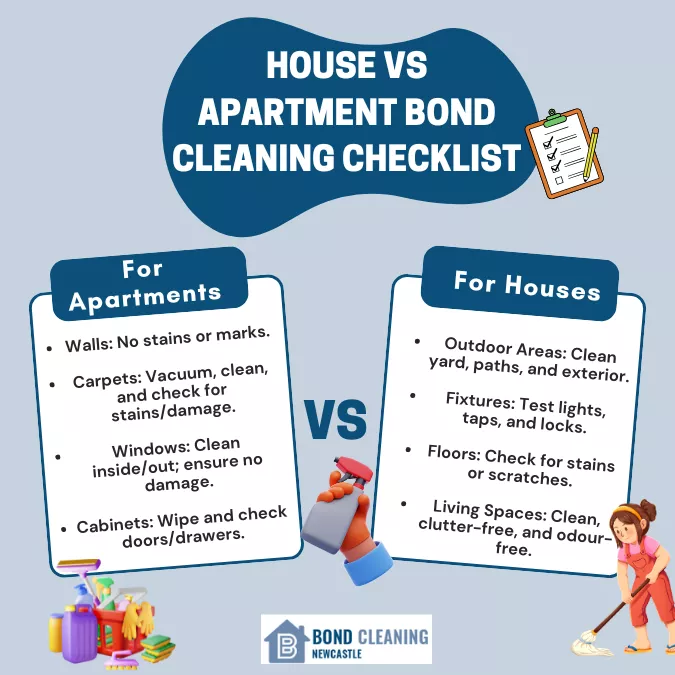
Newcastle Bond Cleaning: Apartment vs House Checklist
More than 60% of tenants in NSW lose a portion of their rental bond due to inadequate cleaning, a number that surprises many. What is even more interesting is that most of these deductions are not because of major issues like property damage or broken fixtures. They happen because of small, easy to miss details: a dusty ceiling fan, oily rangehood filters, streaky windows or stubborn bathroom grime. In the eyes of a property manager, even the tiniest oversight can be enough to withhold your refund, especially if the property does not match the original entry condition report.
This is why understanding the exact difference between cleaning an apartment and a house matters when you are preparing for your move out. Newcastle’s rental market is competitive, and property inspections are usually strict, leaving no room for shortcuts. This article will provide you with a house vs apartment bond cleaning checklist. With a systematic, property specific checklist and a clear plan of action; you can avoid last minute stress while also improving your chances of receiving your bond back.
Hide
Show
- Understanding the Scope of Cleaning: Apartment vs House
- Cleaning Time & Cost Differences: What Tenants Should Expect
- Living Room & Bedrooms: Differences in Cleaning Requirements
- Kitchen & Pantry Cleaning: Where Most Tenants Lose Their Bond
- Bathrooms & Laundry: Deep Cleaning Essentials
- Outdoor Spaces: Difference Between Apartments and Houses
- Final Inspection Checklist: What Real Estate Agents Look For
- Infographic: House vs apartment bond cleaning checklist
- Wrapping Up
1. Understanding the Scope of Cleaning: Apartment vs House
The general scope of work involved is the first significant distinction between bond cleaning a house and an apartment. Apartments usually have simpler structure, fewer rooms and tighter layouts. This makes cleaning easier, but it still takes precision. Every corner must be spotless because smaller spaces make dirt and grime more noticeable. Built ins, mirrored wardrobes, and balconies often need extra attention.
Houses, on the other hand, provide much bigger cleaning areas. More bedrooms, larger living areas, outdoor spaces, driveways and even multiple bathrooms require more time, effort and cleaning supplies. The additional square footage naturally increases the workload and you will more require tools such as pressure washers or garden equipment, to complete everything to inspection standards.
2. Cleaning Time & Cost Differences: What Tenants Should Expect
One of the most overlooked characteristics of bond cleaning is the time and cost difference between cleaning an apartment and a house. Apartments, due to their smaller and more compact size, typically demand less hours of effort and less cleaning products. This implies that if tenants plan ahead of time; they can complete the entire process in one day and spend less time scrubbing. Professional cleaners also charge less for apartments, since they require less labour and equipment.
Houses, however, require a more significant time investment. From multiple bedrooms and bathrooms to outdoor areas and larger kitchens, the cleaning checklist expands quickly. This undoubtedly increases overall cleaning time and in many cases, cost. Professional cleaners usually require additional tools, outside cleaning equipment or more team members to complete a job on time. Understanding these distinctions helps the tenants to better budget and determine, whether to do the cleaning themselves or hire professionals. This is especially very important, when striving for a smooth and successful budget end of lease cleaning Newcastle inspection.
3. Living Room & Bedrooms: Differences in Cleaning Requirements
In apartments; living rooms and bedrooms have fewer surfaces but tighter corners. Dust quickly builds around sliding doors, window tracks, and built in wardrobes. These peculiarities must be carefully considered, while performing bond cleaning for apartments. Carpets may also need steam cleaning depending on your tenancy agreement and blinds should be completely cleaned to remove dust.
Houses typically come with larger living spaces and multiple bedrooms, each with different cleaning needs. High ceilings, bigger windows, and additional furnishings often result in more marks, stains, or dust buildup. Timber flooring may require polishing, while multiple wardrobes need internal and external cleaning. Because of the larger scale; house cleaning naturally takes longer and requires more systematic planning for end of lease cleaning Newcastle.
4. Kitchen & Pantry Cleaning: Where Most Tenants Lose Their Bond

The kitchen is almost always the most scrutinised area during final inspections. In apartments, compact kitchens often mean more grease in tighter spaces. You’ll need to scrub stovetops, clean oven interiors, wipe cupboards inside and out, and clear grime from splashbacks. Built in appliances like dishwashers must be free from mould, food residue, and odours.
House kitchens, meanwhile, are larger and come with additional features like extended countertops, kitchen islands, or walk in pantries. Each of these elements adds to your cleaning checklist. Ovens tend to be larger, pantries hold more dust and exhaust fans gather significant grease over time. Grout cleaning becomes essential, and skipping even a small area can affect your bond refund. Because kitchens accumulate daily cooking stains, this space requires the most elbow grease, whether it is an apartment or a house.
5. Bathrooms & Laundry: Deep Cleaning Essentials
Apartment bathrooms are often small, yet soap scum and mildew collect quickly. Shower screens, tiles, mirrors and taps should all be properly cleaned. Ventilation is usually limited in apartment bathrooms; making mould removal and limescale cleaning essential for a successful inspection. Exhaust fans must also be dust free.
Houses often come with multiple bathrooms, increasing your total cleaning time. Larger shower areas, bathtubs, multiple sinks, and extra storage mean more surfaces to scrub. Laundry rooms in houses often include cupboards, sinks, and benchtops that need detailed wiping. Dust tends to settle heavily in laundries; making them common inspection hotspots. This is where patience and attention to detail become very important in the cleaning process.
6. Outdoor Spaces: Difference Between Apartments and Houses
Outdoor cleaning, is where apartments and houses differ the most. Apartments usually have a balcony that needs sweeping, mopping, cobweb removal and railing cleaning. Drainage areas must be unclogged and stains from pots or furniture must be removed.
Houses, however, have extensive outdoor areas. Patios, gardens, lawns, driveways, garages, and sometimes sheds all require cleaning. You may need to mow the lawn, trim plants, remove rubbish, pressure wash pavements, and clean oil stains from garages. Outdoor areas play a significant role in end of lease cleaning Newcastle inspections, and any ignored corner can impact your bond refund.
7. Final Inspection Checklist: What Real Estate Agents Look For
Real estate agents follow strict inspection checklists, and the properties are assessed based on how clean they are compared to the entry condition report.
For Apartments:- Cleanliness of Walls: Make sure that the walls are free of stains, marks and scuffs.
- Condition of Carpets: Vacuum and clean carpets; check for stains or damage.
- Clarity of Windows: Clean windows inside and out; check for damage.
- Condition of Cabinetry: Wipe down cabinets; ensure doors and drawers work.
- Damage or Missing Items: Ensure light bulbs are working and items like remotes, keys are present.
- Outdoor Cleanliness: Tidy up the yard, paths, and exterior of the house.
- Functionality of Fixtures: Test light fixtures, faucets, and locks.
- Condition of Floors: Check floors for stains, scratches, or damage.
- Overall Appearance of Living Spaces: Make sure that the rooms are clean, clutter free, and odour free.
- Garages, Yards and Storage Spaces: Clean garages and storage areas; ensure locks and doors work.
Infographic: House vs apartment bond cleaning checklist

Wrapping Up
Bond cleaning is all about meeting inspection standards and those standards can vary significantly between apartments and houses. When you understand the differences and follow a structured checklist, the entire move out process becomes far less stressful. With careful planning and the right approach, you can confidently hand back your keys knowing you have done everything needed to secure your full bond refund.

